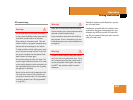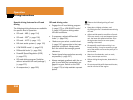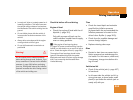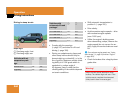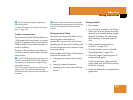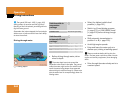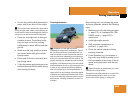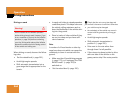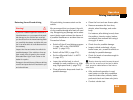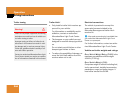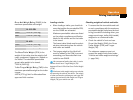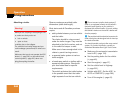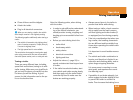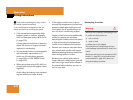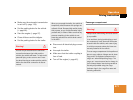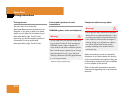
365
Operation
Driving instructions
Returning from off-road driving Off-road driving increases strain on the
vehicle.
We recommend that you inspect the vehi-
cle for possible damage after each off-road
trip. Recognizing any damage and a subse-
quent timely repair reduces the chance of
a possible breakdown or accident later on.
Proceed as follows:
ț Switch off the off-road driving program
(
୴ page 280) or the LOW RANGE
mode* (
୴ page 203).
ț Switch off the DSR (୴ page 276).
ț Set the differential locks* to AUTO
(
୴ page 207).
ț Lower the vehicle back to a level
suitable for road conditions, e.g. High-
way/High-speed level (
୴ page 281).
ț Clean all exterior lamps and check for
possible damage.
ț Clean the front and rear license plate.
ț Remove excessive dirt from tires,
wheels, wheel housings, and under-
body.
For instance, after driving in mud, clean
the radiator, chassis, engine, brakes,
and wheels from extreme dirt using a
strong jet of water.
ț Check tires for possible damage.
ț Inspect vehicle underbody, oil pan,
brake hoses, etc., as well as vehicle un-
derbody for possible damage.
ț Check for brush or branches caught in
the underbody.
ț After continued operation in mud,
sand, water or other dirty conditions
clean the brake discs, wheels, brake
pads and check and clean axle joints.
ț Conduct a brake test.
Warning! G
If you feel a sudden significant vibration or
ride disturbance, or you suspect that possi-
ble damage to your vehicle has occurred,
you should turn on the hazard warning flash-
ers, carefully slow down, and drive with cau-
tion to an area which is a safe distance from
the roadway.
Inspect the tires and under the vehicle for
possible damage. If the vehicle or tires ap-
pear unsafe, have it towed to the nearest
Mercedes-Benz Light Truck Center or tire
dealer for repairs.
Damage to the vehicle may influence driving
comfort and pose the risk of accident to you
and other drivers.
!
Brush or branches could increase the possi-
bility of a fire, as well as cut fuel and/or brake
lines, puncture rubber bellows of the axles or
drive shafts.



